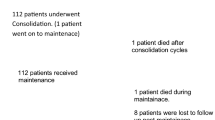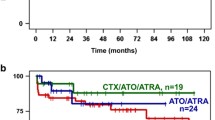Abstract
All-trans retinoic acid (ATRA) is used in the treatment of acute promyelocytic leukemia. Because ATRA has effects (increase in apoptosis, suppression of bcl-2), it has also been used for the treatment of other French-American-British (FAB) subtypes of acute myelogenous leukemia (AML). To find out the in vivo and in vitro effects of ATRA in AML, we analyzed 37 patients with de novo AML. Twenty-seven patients received ATRA before remission-induction (RI) treatment (ATRA group). Results were compared to a control group (10 patients) that received induction without ATRA during the same time period. Bone marrow or peripheral blood samples were collected from all patients on d 0 and 4. The immunphenotype, myeloperoxidase (MPO), reaction and the efflux uptake of rhodamine 123 (Rh123) were analyzed on myeloblasts in these samples. In the myeloblasts from patients treated with ATRA, the uptake of Rh123 was increased significantly (p=0.026) from d 0 to d 4, and all other parameters remained unaltered. ATRA administration increased the complete remission (CR) rate (88%, 22/25 vs 55%, 5/9) significantly (p=0.042). Logistic regression analysis revealed that ATRA administration was the important factor in CR, among other potential factors including age, white blood count, bcl-2 expression, and the uptake and efflux of Rh123 (p=0.05). Estimated disease-free survival and overall survival were similar between these two groups (43% vs 37.5% and 51.2% vs 37.5%, respectively). In conclusion, ATRA treatment prior to RI treatment may improve the CR rate in patients with de novo AML, which seems to be related to its beneficial effect on multidrug resistance.
Similar content being viewed by others
References
Bishop, J. F., Matthews, J. P., Young, G. A. R., Bradstock, K. and Lowenthal, R. M. (1998). Intensified induction chemotherapy with high dose cytarabine and etoposide for acute myeloid leukemia. A review and updated results from Australian Leukemia Study group. Leukemia Lymphoma 28:315–327.
Heil, G., Hoelzer, D., Sanz, M. A. (1997). A randomised, double-blind, place-controlled, phase III study of filgrastrim in remission induction and consolidation therapy for adults with de novo acute myeloid leukemia. The International Acute Myeloid Leukemia Study Group. Blood 90:4710–4718.
Marie, J. P., Zhou, D. C., Gurbuxani, S., Legrand, O. and Zittoun, R. (1996). MDR1/P-glicoprotein in haematological neoplasms. Eur. J. Cancer 32A:1034–1038.
Hickman, J. A. (1996). Apoptosis and chemotherapy resistance. Eur. J. Cancer 32A:921–926.
Goldstein, L. J., Golski, H., Fojo, A. (1989). Expression of a multidrug resistance gene in human cancers. J. Natl. Cancer Inst. 81:116–124.
Musto, P., Melillo, L., Lombardi, G., et al. (1991). High risk of early resistant relapse for leukaemic patients with presence of multidrug resistance associated P-glycoprotein positive cells in complete remission. Br. J. Haematol. 77:50–53.
Sato, H., Gottesman, M. M., Goldstein, L. J., et al. (1990). Expression of the multidrug resistance gene in myeloid leukemias. Leukemia Res 14:11–21.
Zhou, D. C., Marie, J. P., Suberville, A. M. and Zittoun, R. (1992). Relevance of mdr1 gene expression in acute myeloid leukemia and comparison of different diagnostic methods. Leukemia 6:879–885.
Beksac, M., Akan, H., Koc, H., et al. (1992). P-glycoprotein expression in refractory hematological neoplasms and circumvention of resistance with verapamil or cyclosporin A containing regimens. Med. Oncol. Tumor Pharmacol. 9:101–105.
Campos, L., Guyotat, D., Archimbaud, E. (1992). Clinical significance of multidrug resistance P-glicoprotein (P170) expression on acute nonlymphoblastic leukemia cells. Blood 79:473–476.
Pirker, R., Wallner, J., Geissler K., et al. (1991). MDR1 gene expression and treatment outcome in acute myeloid leukemia. J. Natl. Cancer Inst. 83:708–713.
Marie, J. P., Faussat-Suberville, A. M., Zhou, D. and Zittoun, R. (1993). Daunorubicin uptake by leukemic cells: correlation with treatment outcome and mdr1 expression. Leukemia 7:825–831.
Leith, C. P., Chen, I. M., Kopecky, K. J., et al. (1995). Correlation of multidrug resistance (MDR1) protein expression with functional dye/drug efflux in acute myeloid leukemia (AML) by multiparameter flow cytometry: identification of discordant MDR-/efflux+ and MDR+/effluxcases. Blood 86:2329–2342.
Sincock, P. M. and Ashman, L. K. (1997). Expression of c-Kit and functional drug efflux are correlated in de novo acute myeloid leukemia. Leukemia 11:1850–1857.
Martinez, A., San Miguel, J. F., Valverde, B., et al. (1997). Functional expression of MDR1 in acute myeloid leukemia: correlation with the clinical-biological, immunophenotypical, and prognostic disease characteristics. Ann. Hematol. 75:81–86.
Sonneveld, P. (1996). Reversal of multidrug resistance in acute myeloid leukemia and other hematological malignancies. Eur. J. Cancer 32A:1062–1069.
Reed, J. C. (1995). Bcl-2 family proteins and mechanisms of chemoresistance in lymphomas and leukemias. Adv. Leukemia Lymphoma 5:3–11.
Miyashita, T. and Reed, J. C. (1993). Bcl-2 oncoprotein blocks chemotherapy-induced apoptosis in a human leukemia cell line. Blood 81:151–157.
Campos, L., Sabido, O., Rouault, J. P. and Guyotat, D. (1994). Effects of bcl-2 antisense oligodeoxynucleotides on in vitro proliferation and survival of normal marrow progenitors and leukemic cells. Blood 84:595–600.
Bradbury, D. A. and Russel, N. H. (1995). Comparative quantitative expression of bcl-2 by normal and leukaemic myeloid cells. Br. J. Haematol. 91:374–379.
Hu, Z., Yang, G. S., Li M., et al. (1995). Mechanism of cytosine arabinoside toxicity to the blast cells of acute myeloblastic leukemia:involvement of free radicals. Leukemia 9:789–798.
Hu, Z.-B., Minden, M. D. and McCulloch, E. A. (1995). Direct evidence for the participation of bcl-2 in the regulation by retinoic acid of the Ara-C sensitivity of leukemic stem cells. Leukemia 9:1667–1673.
Miyashita, T. and Reed, J. C. (1992). Bcl-2 gene transfer increases relative resistance of S49.1 and WEHI7.2 lymphoid cells to cell death and DNA fragmentation induced by glucocorticoids and multiple chemotherapeutic drugs. Cancer Res. 52:5407–5411.
Kondo, S., Yin, D., Morimura, T. and Takeuichi, J. (1994). Bcl-2 gene prevents induction of apoptosis in L1210 murine leukemia cells by SN-38, a metabolite of the camphotecin deriative CPT-11. Int. J. Oncol. 4:649–654.
Campos, L., Rouault, J. P., Sabido, O., et al. (1993). High expression of bcl-2 protein in acute myeloid leukemia cells is associated with poor response to chemotherapy. Blood 81:3091–3096.
Karakas, T., Maurer, U., Weidmann, E., et al. (1998). High expression of bcl-2 mRNA as a determinant of poor prognosis in acute myeloid leukemia. Ann. Oncol. 9:159–165.
Maung, Z. T., MacLean, E. R., Reid, M. M., et al. (1994). The relationship between bcl-2 expression and response to chemotherapy in acute leukemia. Br. J. Haematol. 88:105–109.
Campos, L., Oriol, P., Sabido, O. and Guyotat, D. (1997). Simultaneous expression of p-glicoprotein and bcl-2 in acute myeloid leukemia blast cells. Leukemia Lymphoma 27:119–125.
Del Poeta, G., Del Poeta, G., Venditti, A., Aronica, G., et al. (1997). Simultaneous P-glycoprotein and bcl-2 overexpression identifies a subset of acute myeloid leukemia patients at worst prognosis. Blood 90:302a (abstract).
Avvisatti, G., Lococo, F., DiVerio, D., et al. (1996). AIDA (all-trans-retinoic acid+idarubucin) in newly diagnosed acute promyelocytic leukemia: a Gruppo Italiano Malattie Ematologiche Mailgne dell’Adulto (GIMEMA) pilot study. Blood 88:1390–1398.
Hu, Z.-B., Minden, M. D. and McCulloch, E. A. (1996). Post-transcriptional regulation of bcl-2 in acute myeloblastic leukemia: significance for response to chemotherapy. Leukemia 10:410–416.
Zheng, A., Mantymaa, P., Saily, M., et al. (1999). An association between mitocondrial function and all-trans retinoic acid-induced apoptosis in acute myeloblastic leukemia cells. Br. J. Haematol. 105:215–224.
Tosi, P., Pellacani, A., Visani, G., et al. (1999). In vitro treatment with retinoids decreases bcl-2 protein expression and enhances dexamethasone-induced cytotoxicity and apoptosis in multiple myeloma cells. Eur. J. Haematol. 62:143–148.
Eck, K. M., Yuan, L., Duffy, L., et al. (1998). A sequential treatment regimen with melatonin and all-trans retinoic acid induces apoptosis in MCF-7 tumour cells. Br. J. Cancer 77:2129–2137.
Zou, C. P., Kurie, J. M., Lotan, D., et al. (1998). Higher potency of N-(4-hydroxyphenyl) retinamide than all-trans-retinoic acid in induction of apoptosis in non-small cell lung cancer cell lines. Clin. Cancer Res. 4:1345–1355.
Venditti, A., et al. (1995). All-trans retinoic acid and low-dose cytosine arabinoside for the treatment of a poor prognosis acute myeloid leukemia. Leukemia 9:1121–1125.
Estey, E. H., Thall, P., Pierce, S., et al. (1999). Randomised phase II trial of fludarabine+ara-c+idarubicin+/-all-trans retinoic acid (ATRA) +/-G-CSF in poor prognosis newly diagnosed acute myeloid leukemia and myelodysplastic syndrome. Blood 93:2478–2484.
Seiter, K., Feidman, E. J., Dorota Halicka, H., et al. (2000). Clinical and laboratory evaluation of all-trans retinoic acid modulation of chemotherapy in patients with acute myelogenous leukaemia. Br. J. Haematol. 108;40–47.
Karp, J., Kapoport, C., Sarkodee-Adoo, D., et al. (1999). Two-cycle tied sequential therapy (TST) of adult acute myelobenous leukemia (AML) plus all-trans retinioic acid (ATRA) priming:Early results of a phase II trial. Blood 94: 1338a (abstract).
Young, I. T. (1977). Proof without prejudice use of the Kolmogrov-Smirnov test for the analysis of histograms from flow systems and other sources. J. Histochem. Cytochem. 25:935–941.
Beksac, M., Arslan, O, Koc, H., et al. (1998). Randomised unicenter trial for comparison of three regimens in de novo adult acute nonlymphoblastic leukemia. Med. Oncol. 15:183–190.
Yang, G. S., Minden, M. D. and McCulloch, E. A. (1994). Regulation by retinoic acid and hydrocortisone of the antracycline sensitivity of blast cells of acute myeloblastic leukemia. Leukemia 8:2065–2075.
Yang, G. S., Minden, M. D. and McCulloch, E. A. (1993). Influence of schedule on regulated sensitivity of AML blasts to cytosine arabinoside. Leukemia 7:1012–1019.
Haldar, S., Jena, N. and Croce, C. M. (1995). Inactivation of bcl-2 by phosphorylation. Proc. Natl. Acad. Sci. USA 92:4507–4511.
Haldar, S., Chintapalli, J. and Croce, C. M. (1996). Taxol induces bcl-2 phosphorylation and death of prostate cancer cells. Cancer Res. 56:1253–1255.
Hu, Z.-B., Minden, M. D. and McCulloch, E. A. (1998). Phosphorylation of bcl-2 after exposure of human leukemic cells to retinoic acid. Blood 92:1768–1775.
Dufour, P., Feugeas, O., Bergerat, J. P. and Oberling, F. (1994). Modulation of adriamicin cytotoxicity on K562 and K562adri cells by interferon alfa and/or all-trans-retinoic acid. Bull. Cancer 81:894–896.
Akihiro, T., Takeshito, A., Shinjo, K., et al. (2000). Role of P-glycoprotein in all-trans retinoic acid (ATRA) resistance in acute promyelocytic leukemia cells: analysis of intracellular concentration of ATRA. Br. J. Haematol 108:90–92.
Ketley, N. J., Allen, P. D., Kelsey, S. M. and Newland, A. C. (2000). Mechanisms of resistance to apopitosis in human AML blasts. the role of differentiation-induced perturbations of cell-cycle checkpoints. Leukemia 14:620–628.
Andreeff, M., Jiang, S., Zhang, X., et al. (1999). Expression of bcl-2-related genes in normal and AML progenitors: changes induced by chemotherapy and retinoic acid. Leukemia 13:1881–1892.
Author information
Authors and Affiliations
Corresponding author
Rights and permissions
About this article
Cite this article
Üstün, C., Beksac, M., Dalva, K. et al. In vivo use of all-trans retinoic acid prior to induction chemotherapy improves complete remission rate and increases rhodamine 123 uptake in patients with de novo acute myeloid leukemia. Med Oncol 19, 59–67 (2002). https://doi.org/10.1385/MO:19:1:59
Received:
Accepted:
Issue Date:
DOI: https://doi.org/10.1385/MO:19:1:59




